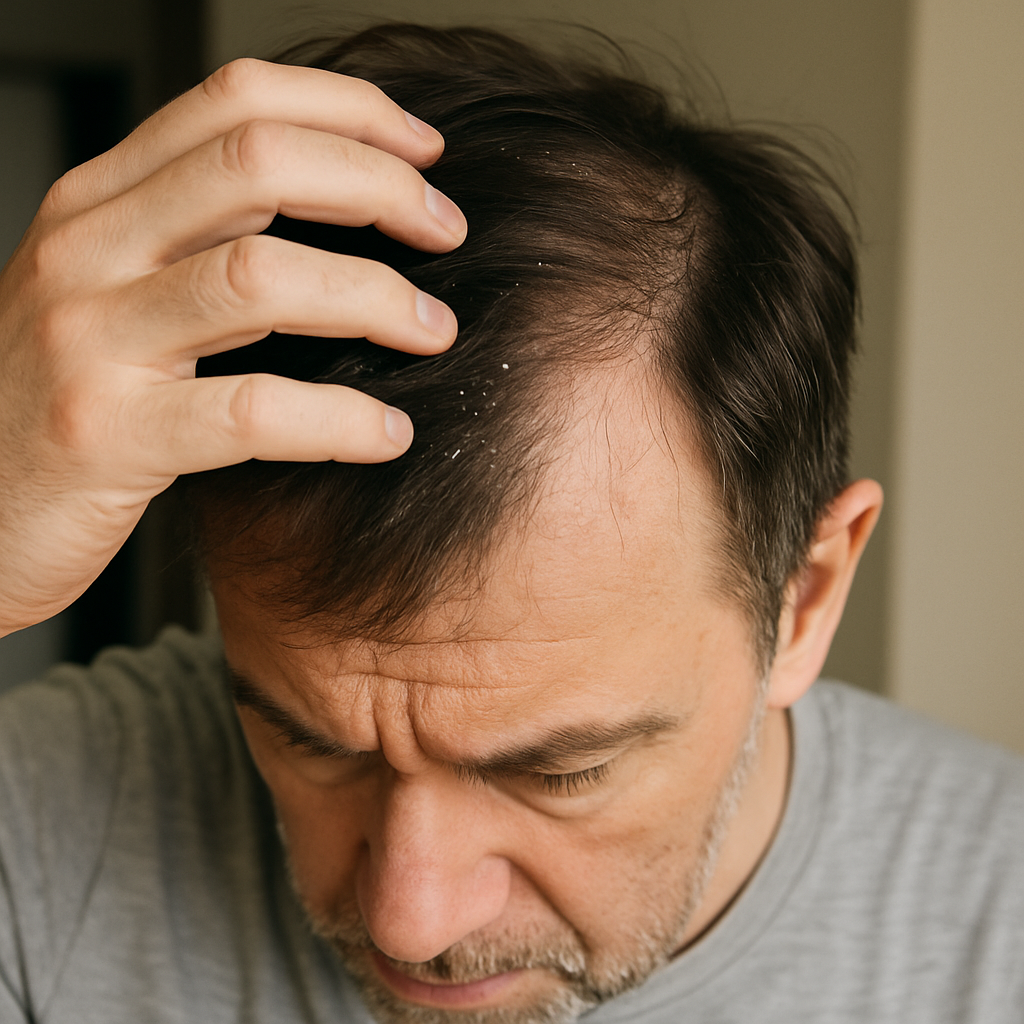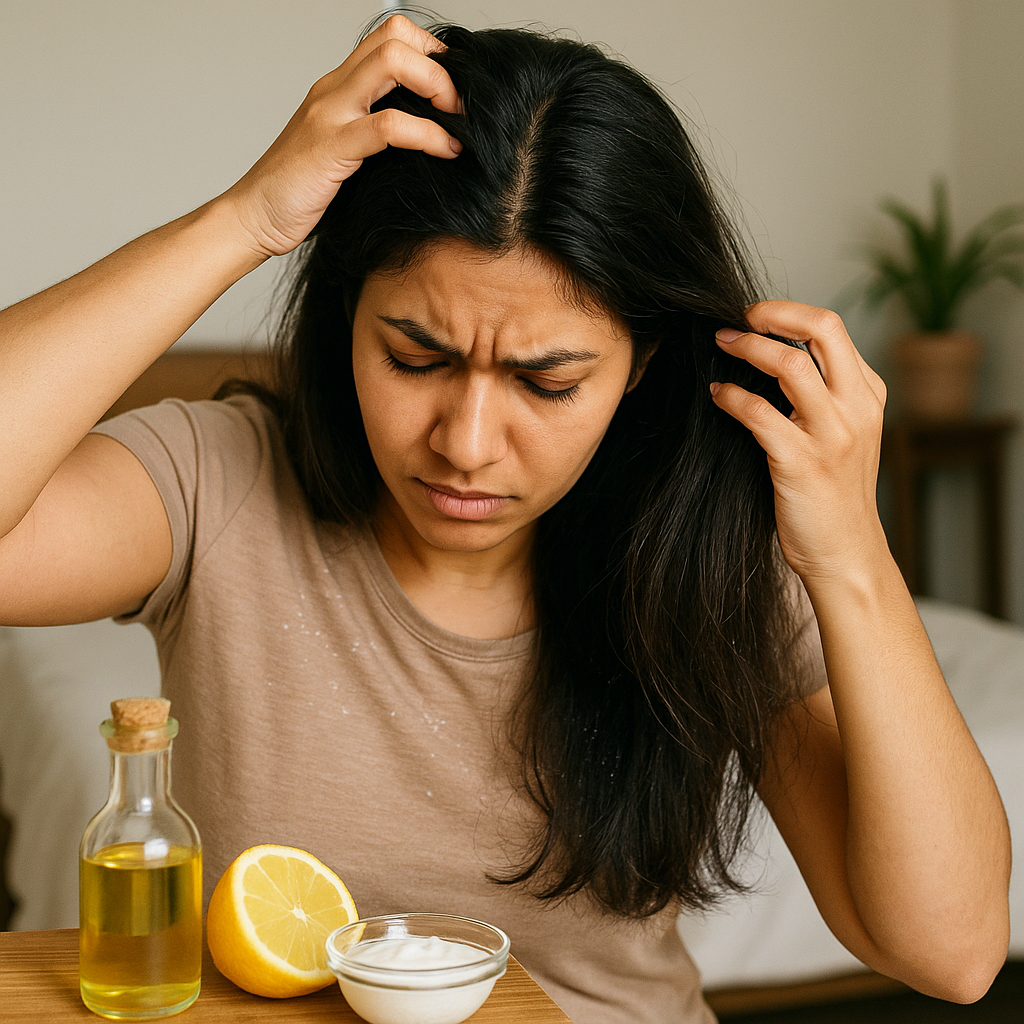Ask Ayurvedic doctor a question and get a consultation online on the problem of your concern in a free or paid mode. More than 2,000 experienced doctors work and wait for your questions on our site and help users to solve their health problems every day.
Does Dandruff Cause Hair Fall? Ayurvedic Insights and Remedies

Let’s be honest—finding flakes on your shirt or pillow can feel, well, gross. And when your hair starts thinning or falling out at the same time? It’s natural to panic a little. Many people wonder: does dandruff cause hair fall? Or can dandruff cause hair fall to the point where it becomes serious?
Spoiler: yes, there is a connection between dandruff and hair loss. But it’s more complex than just dry scalp = hair fall. This article dives deep into that connection from an Ayurvedic lens, exploring how dandruff causes hair fall, the best home remedies, and what to look for in the best Ayurvedic shampoo for dandruff and hair fall. Whether you're battling white flakes, hair shedding, or both—there’s real help ahead. Let’s get into it.
Can Dandruff Cause Hair Fall? The Ayurvedic Explanation
Ayurveda, the ancient Indian science of holistic health, doesn’t treat dandruff and hair fall as separate issues. Instead, it views them as signs of imbalance in the body—specifically in the doshas: Vata, Pitta, and Kapha.
According to Ayurvedic texts, excess Pitta can lead to inflammation in the scalp, which irritates the hair follicles and leads to—you guessed it—hair loss. Meanwhile, an imbalance in Vata dries out the scalp, creating those pesky flakes we know as dandruff. When both doshas are out of sync, you may experience the full package: dandruff and hair loss happening simultaneously.
And because Ayurveda looks at root causes instead of just symptoms, it provides long-term, holistic solutions. Not just short fixes with chemical shampoos.

Don't wait or self medicate. Start chat with Doctor NOW
How Dandruff Leads to Hair Loss: Root Causes
So, how exactly does dandruff cause hair loss? Here’s a breakdown that blends modern logic with Ayurvedic wisdom:
-
Inflammation: Dandruff triggers itching. You scratch. That scratching causes inflammation, which weakens hair follicles and leads to hair fall. It’s like pulling grass out of soil that’s already cracked and dry.
-
Blocked Follicles: Flakes clog up hair follicles, suffocating the root and stopping healthy growth.
-
Fungal Overgrowth: A common cause of dandruff is the fungus Malassezia. It feeds on sebum (natural oils on your scalp) and creates oleic acid, which can irritate and inflame. Irritated scalp = weaker hair hold.
-
Poor Scalp Circulation: A dry, itchy scalp reduces blood flow, which is essential for strong hair roots.
So yeah, dandruff causes hair fall—it doesn’t directly pull out your hair, but it sets up the worst possible environment for it to thrive. And unless you address both dandruff and scalp health, hair fall is likely to continue.
Home Remedies for Dandruff and Hair Fall
Let’s get to the good part. If you’re asking about home remedies for dandruff and hair fall, you’re not alone—and thankfully, you’re also not out of luck.
Here’s a few time-tested, natural solutions that actually work (but you gotta be consistent):
-
Neem Oil: This antifungal superstar kills the fungus responsible for dandruff and soothes the scalp. Apply warm neem oil 2x a week before showering.
-
Aloe Vera Gel: Apply fresh aloe gel directly to the scalp. Leave it on for 30 minutes before rinsing. It cools Pitta, moisturizes dry scalp, and reduces flaking.
-
Fenugreek Seeds (Methi): Soak overnight, grind to a paste, and apply to scalp. Rinse after 30 mins. Fenugreek is rich in protein and nicotinic acid—great for fighting dandruff hair loss.
-
Apple Cider Vinegar: This one's not Ayurvedic, but it balances scalp pH and helps reduce fungal growth. Mix with water and use as a rinse twice a week.
Yes, they take a bit more effort than grabbing a bottle off the shelf—but these remedies can restore your scalp’s balance without harsh chemicals. And they don't mess with your hair texture, either.
Best Ayurvedic Shampoo for Dandruff and Hair Fall
Okay, so now you’re thinking—“Those home remedies sound good and all, but I really need something I can use daily, in the shower. What’s the best Ayurvedic shampoo for dandruff and hair fall?”
Fair question.
Ayurvedic shampoos are a gentler, more holistic alternative to chemical-heavy commercial options. They're typically free from sulfates, parabens, and artificial fragrances—which often irritate the scalp and worsen the very problems they claim to fix.
When choosing a hair fall and dandruff shampoo with Ayurvedic roots, here’s what you wanna look for:
-
Neem: Anti-fungal and anti-inflammatory. Targets the root cause (literally) of dandruff.
-
Bhringraj: Known as the “king of herbs” for hair. Boosts blood flow and strengthens follicles.
-
Shikakai: A natural cleanser that maintains the scalp’s moisture balance.
-
Amla (Indian Gooseberry): Rich in vitamin C and antioxidants. Reduces Pitta and boosts hair growth.
-
Tea Tree Oil: While not traditionally Ayurvedic, many modern Ayurvedic shampoos include it because of its potent dandruff-fighting properties.
Some people swear by DIY shampoo powders, but if you're buying off the shelf, go for brands that list these herbs at the top—not just as a marketing afterthought buried in the fine print.
Honestly, you might need to test a couple before finding your “match.” Everyone’s scalp is different, and what works for one person may not vibe with yours.
And here’s a weird tip that works: don’t overwash. Washing your hair every day, even with the best Ayurvedic shampoo for dandruff and hair fall, can strip natural oils and trigger more dryness. Try 2–3 times a week instead.
Natural Ingredients That Help Treat Both
Let’s zoom in on some powerhouse ingredients you’ll find in both Ayurvedic shampoos and DIY masks that treat dandruff and hair loss at the same time:
-
Tulsi (Holy Basil): Clears out clogged follicles, fights bacteria, and cools the scalp.
-
Licorice Root (Yashtimadhu): Soothes irritated skin and supports new hair growth.
-
Reetha (Soapnut): Natural cleanser that removes grime and oil without disrupting pH balance.
-
Curry Leaves: Yes, the same ones you use in your kitchen. Rich in beta-carotene and proteins.
The beauty of Ayurveda is that many of these ingredients do double duty: they reduce dandruff and nourish hair roots. It’s not about attacking symptoms—it’s about healing the ecosystem of your scalp.
Quick heads-up though: sometimes, when you first switch to Ayurvedic or natural products, your hair might feel different. Maybe drier, maybe oilier. That’s normal. Your scalp’s just adjusting to the lack of synthetic stuff it’s gotten used to. Give it a few weeks.
Also, don’t go mixing ten ingredients at once. Start small, track what works, and build from there.

Tips to Control Dandruff Without Damaging Hair
Now that we’ve covered the what and the why, let’s talk about the how — how to get rid of dandruff and hair fall without turning your hair into a frizzy mess.
Here are some tips that actually work (and no, you don’t need a PhD to follow them):
1. Oil, But Don’t Overdo It
A lot of people ask: Should I oil my hair if I have dandruff? The answer is: it depends.
Oiling with coconut or neem oil can soothe your scalp and reduce flaking, if done properly. But slathering oil and letting it sit for days? Nope. That just traps dust, encourages fungus, and makes things worse. Aim for once or twice a week, and always shampoo it out after a few hours.
2. Avoid Super Hot Water
This one’s underrated. Hot water strips your scalp’s natural oils, drying it out and making dandruff worse. Go for lukewarm instead. Or cold, if you’re brave enough.
3. Say No to Harsh Chemicals
Avoid shampoos loaded with sulfates and alcohol-based products. They may give you that “squeaky clean” feel, but in reality, they disrupt your scalp’s balance and lead to even more flakes.
Use a hair fall and dandruff shampoo that contains natural ingredients, as mentioned earlier. Your scalp will thank you.
4. Stay Consistent
This one’s boring, but important. You won’t see results overnight. Whether it’s using the best Ayurvedic shampoo for dandruff and hair fall, applying neem oil, or trying fenugreek paste—consistency is key. Stick to a routine for at least 3–4 weeks before judging its effectiveness.
5. Diet & Hydration
Surprised to see this here? Ayurveda teaches that what you eat shows up on your skin—and your scalp’s just skin, after all. Spicy, oily, or fried food can increase Pitta and worsen dandruff. Drink more water, eat cooling foods like cucumber and yogurt, and reduce stress (easier said than done, but still).
Conclusion
So, let’s circle back to the big question: does dandruff cause hair fall?
Yes. And no.
Dandruff causes hair fall when it leads to scalp inflammation, blocks hair follicles, and weakens roots. But it doesn’t have to be permanent or unmanageable. With the right mix of home remedies for dandruff and hair fall, mindful hair care, and Ayurvedic solutions—you can reverse the damage.
The truth is, most of us wait until things get really bad before acting. But your scalp is trying to tell you something now. Don’t ignore it.
Try a homemade mask. Switch to a gentle, natural shampoo. Take small, consistent steps.
Your hair doesn’t have to keep falling out like leaves in Autumn. 🌿
FAQs
Is hair fall due to dandruff reversible?
Yep. If you catch it early and treat the scalp correctly, most dandruff-related hair fall can be reversed. But long-term neglect may lead to permanent thinning in some spots.
Will dandruff stop if I go bald?
Technically yes, but that’s a pretty extreme solution! Dandruff happens on the scalp, not the hair itself. If there’s no hair, flakes may still appear on the skin.
Should I oil my hair if I have dandruff?
Yes—but wisely. Use oils like neem or tea tree in moderation, leave them in for a couple of hours max, and wash thoroughly. Oiling too much or leaving it overnight can clog pores and make dandruff worse.
If this article helped you, share it with someone who’s been scratching their scalp a little too often lately. And hey—treat your scalp like skin, not like something you just wash and forget. It’s the root of healthy hair, after all. ✨

